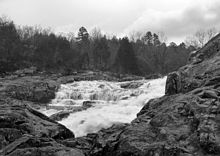| Ozark National Scenic Riverways | |
|---|---|
IUCN category V (protected landscape/seascape) | |
 The Ozark National Scenic Riverways (red) and the nearby Eleven Point National Wild and Scenic River (green) | |
| Location | Shannon, Carter, Dent, and Texas Counties, Missouri |
| Nearest city | Salem, Van Buren, and Eminence |
| Coordinates | 37°11′27″N 91°16′35″W / 37.1907°N 91.2763°W |
| Area | 80,000 acres (324 km2) |
| Established | 1964-08-27 |
| Visitors | 1,789,783 (in 2007) |
| Governing body | National Park Service |
| Website | Ozark National Scenic Riverways |


The Ozark National Scenic Riverways is a recreational unit of the National Park Service in the Ozarks of southern Missouri in the U.S.
The park was created by an Act of Congress in 1964 to protect the Current and Jacks Fork rivers, and it was formally dedicated in 1971. The park's 80,000 acres (324 km2) are used for many forms of recreation and are home to abundant animal and plant species. 1.3 million recreational visits are estimated annually. Canoeing is one of the most popular activities. Kayaking and inflatable rafts and tubes add to the volume of river floaters. Motorized boating with jonboats is also a popular activity of locals and nearby Missourians. Other activities include horseback riding, hunting, hiking, fishing, camping, birdwatching, nature photography, and sightseeing.
The park service promotes the Current River as one of the midwest's best float streams, in part due to the contributions of some of the nation's largest springs. The headwaters of the Current River begin at the confluence of Pigeon Creek and Montauk Springs in Montauk State Park. Other notable springs along its course include Welch Spring, Cave Spring, Pulltite Spring, Round Spring, Fire Hydrant Spring, Ebb and Flow Spring, Blue Spring, Big Spring, and Gravel Spring. The park contains the United States' largest concentration of first magnitude springs (which are defined as having average flow of more than 100 cu ft/s (2.8 m3/s)) in dolomite rock. The only comparable spring collections are the limestone springs of North Florida near Gainesville and the igneous-based springs of Idaho's Snake River.